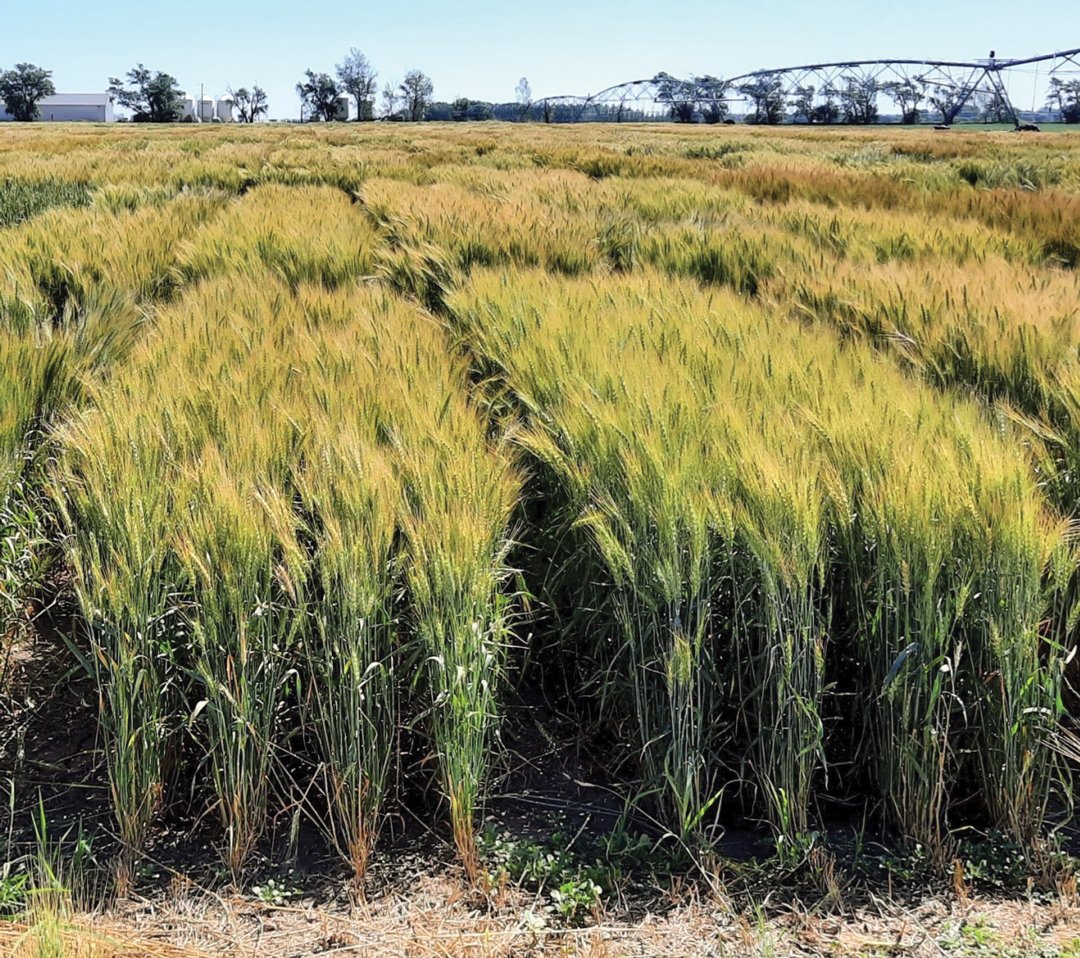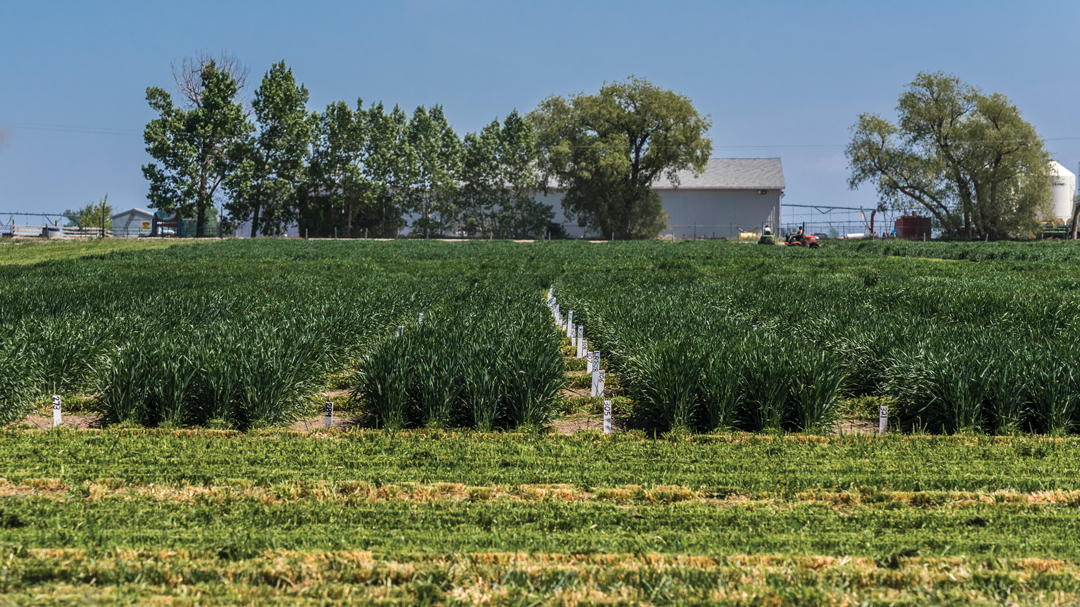THE FARM VOTE
BY TREVOR BACQUE
Spring of 2023 will be a lively political time as Alberta’s general election pits the UCP and new Premier Danielle Smith against the NDP and former premier Rachel Notley.
While rural Alberta is often assumed to be a bastion of blue, 11 ostensibly rural ridings turned orange in 2015, many for the first time in a generation. A re-United group of conservatives stormed back to power, winning all rural ridings in 2019.
Agriculture is at the forefront of political discussion. Where do parties stand on hot button ag issues? Is the UCP taking its rural power base for granted? Does the NDP better understand the needs of rural citizens?
Janet Brown is a seasoned political commentator and pollster. She said the biggest concerns for Albertans in 2015 were health care and education and they turned to the NDP. In 2019, the top issue was economic prosperity and the UCP responded with a 63-seat victory. All three areas are top concerns in 2023.
Brown noted the UCP is in chaos while the more stable NDP has had one leader for nearly a decade. She believes the NDP couldn’t do better if they tried, given multiple missteps by the new premier. “A truism in politics is when the opponent is doing enough self-inflicted damage, just stand back and let them,” she said.

Brown recently measured Alberta’s available vote. There is a greater available vote among conservative voters, but they are much more uncertain of their voting intention. Available liberal voters, while fewer, are firmly decided.
“If the UCP could shore up their available vote, they would be unstoppable,” said Brown. “One party has a much larger available vote than the other, but the one party is in disarray and the other party solid. That’s what it comes down to.”
Brown said either party could win. She has often likened the province’s politics to a three-legged stool, represented by Calgary, Edmonton and the rest of Alberta. The winning party typically takes two legs, if not three, but that’s not Smith’s strategy. It confuses Brown. “Danielle Smith has put forward a plan where she’s saying, ‘No, I only need 1.5 legs. That, to me, is a pretty risky strategy.
“Edmonton is probably lost to the UCP for a generation, obviously outside of Calgary is where the UCP has their strength; So that means, to me, it’s Battleground Calgary.” Brown also pointed out the UCP is not guaranteed to take smaller cities. She cited Alberta’s third-largest city. “Is your average voter in Red Deer happy the leadership campaign was dominated by discussion about a sovereignty act and absolutely no discussion about health care? And when they did talk about health care, it was about re-litigating COVID? Danielle Smith could be miscalculating when she talks about ridings outside of Calgary and Edmonton, they’re not all rural.”
Since early March, 13 official polls have been conducted. None show the NDP below 40 per cent support. During the same period, the UCP drew between 30 and 47 per cent. Brown said rural Alberta, where UCP support runs highest, is not tight-knit. She noted negative COVID sentiment was highest in rural Alberta, yet the majority of rural Albertans got the jab.
“Certainly, the anti-vax sentiment is higher in rural Alberta, certainly the separatist sentiment is higher in rural Alberta, but it’s still not the majority opinion even in rural Alberta,” said Brown. “But in a way, the rural areas are more divided on these things than even people in the city are.”
This bodes well for Rachel Notley.
NO LONGER NEOPHYTES
Predominantly supported by urban voters, the NDP claims to be the only party with an agricultural plan for the province. “Honestly, I don’t think the UCP has a plan for agriculture,” said Heather Sweet, NDP MLA for Edmonton-Manning and the party’s ag critic. “I think they have taken agriculture for granted.”
Sweet pointed to a lack of value-added investment in Alberta while Saskatchewan and Manitoba woo investors with much faster approval and response times. She claimed what takes three months in those provinces takes about a year in Alberta.
“The value-added investment opportunities have not been explored and or supported,” she said. “The UCP really do ignore rural Alberta and have for a long time. “Three years later we’re still waiting for this government to step up and really promote and be the champion of agriculture.”
It’s been almost four years since they governed, but Sweet said the NDP positively benefitted rural Albertans through its Climate Leadership Plan and sustainable endeavours such as the grain dryer subsidy. “Every year, agriculture producers were applying to that program and it was oversubscribed,” she said. “It really spoke to the willingness and opportunity agriculture producers saw and moving to green tech and being able to bring down their costs. The grain dryer program almost became a necessity for many of our producers. That was probably one of the best things we could do and I’m open to hearing from producers around what other ideas they would have when it comes to building a program like that.”
She also said rural communities have weakened under the UCP. Job cuts to small towns, cities and rural areas have excessively strained communities, and the NDP would fight hard to reverse this, she said. “The cuts … put a lot of pressure on local economies to try to find different ways to create revenue,” she said. “In our smaller communities, without support from the Province, they don’t have the ability to grow and attract investment. We have to focus on … doing that.”
Beyond this, the NDP plans to help farmers address climate change issues and the federal carbon tax. Sweet said the provincial government can’t change what happens at a national level, but it can work with farmers to navigate federal policies. “We can definitely make sure we are creating policies here in Alberta that can help address those demands,” she said.
“We were a little delayed in 2015, but we’re ready in 2023. If people in rural Alberta give us that opportunity, they will see we have a clear plan to drive the economy forward.”
A RURAL ROUTE IN 2023
Minister of Agriculture and Irrigation, Nate Horner said the government is fortunate to have a large rural support base and is proud of the UCP’s achievements in agriculture. The successor to embattled former ag minister Devin Dreeshen, Horner emphasized the party’s agricultural track record speaks for itself. He cited “generational” investment in irrigation and renewed focus on value-added investment.
He also said a firm but co-operative focus is required to ensure Albertans, but mostly farmers, are treated fairly under federal climate policies through a strong business risk management suite. Horner said he is working hard for a fair outcome on the upcoming pilot project via the Sustainable Canadian Agriculture Partnership (CAP) that will see farm practices tied to crop insurance premiums.
“For those concerned about the pilot, let’s just wait and see,” he said. “I’m still very optimistic it can be a positive thing. They’re allowing us the flexibility to walk into this in ways we can support producers while showing there are positive actions that can help them on their farm and help us achieve some of these broader environmental goals.”
Horner is particularly proud of irrigation infrastructure spending and said, to date, the government has invested $1.4 billion in agriculture and created more than 2,000 jobs in value-added agrifood, noting they did so a year ahead of schedule. Still, there’s more work to be done. “Going forward is making sure we’re as competitive as possible in comparison to our neighbouring jurisdictions,” he said of western provinces and northwestern states.
He concedes Sweet “is not entirely wrong” with the assertion approvals and communication between government and potential investors takes too long. “It’s something we’re attempting to address,” he said. Part of the reason for the lengthy timelines is Alberta’s multiple Crown corporations, whereas in Saskatchewan, for example, everything is housed within the ag ministry. He did say, though, it’s disingenuous the NDP would call foul on UCP ag policies.
“All they did was add red tape to my business and I can’t recall a single large investment opportunity in agriculture during their time,” he said. “The NDP’s main ag policy from my recollection was Bill 6, which took us a while to rectify. It was something no one was asking for.”
He said his ministry is focused where concern is strongest. “I hear that in value-added investment. I hear that in reducing red tape. And I hear that in robust business risk management programs and making sure we clearly outline our position to the feds when it comes to things like fertilizer emission consultation. It’s coming from where the people are.”
Regarding climate, Horner believes Alberta can be part of the solution, but said the province’s ag sector is not treated fairly. “We contribute to the carbon cycle in a very positive way that is not recognized by the federal government. So, they’re finding neat ways to tax and drain and transfer wealth from agriculture and rural [areas] and rebate it to individuals across the country. We feel like that is completely unfair and is a policy that drives negative outcomes.”
The province lost its Supreme Court challenge opposing the carbon tax, but Horner insists it must go. At $170 per tonne in 2030, it will “wreak havoc” on rural Alberta, hurt the electrical grid and the attraction of value-added investment, the centrepiece of the UCP’s ag ambitions, should they be re-elected.
FARMER REPRESENTATION
The Alberta Wheat and Barley Commissions will work with whichever party forms government, said Shannon Sereda, government relations, policy and markets director. She said the UCP formed a positive and attentive relationship with the commissions. “We’ve been pleased with the level of consultation and happy with the UCP’s response when issues are raised.”
Sereda believes the UCP understands and defends the interests of farmers and points to trespassing legislation and the agriculture war room—similar to the body created for energy—though it never really took off.
As well, she said during the NDP’s one term in office, while they had a lot to learn, the commissions were heard by the Notley government. “We found common ground within their term,” said Sereda. “As the opposition, I think they’ve come a long way in building their capacity in understanding agricultural issues.”
Both parties, Sereda noted, lack clear direction on climate change and greenhouse gas emissions and what plan, if any, will be formed to help farmers address these primarily federal policies.
“We haven’t heard much from either party around their response to help mitigate the impacts of this climate change and emission reduction policy that will have an effect on farmers,” she said. “It’s hard to reconcile how this is such a major federal government policy coming down the pipeline and how there’s very little response from the provincial government.”
In addition, Sereda noted concern about the upcoming Sustainable CAP pilot project. The primary concern being higher payments if one’s practices do not align with federal guidelines.
“Farmers are concerned the viability of the sector is threatened by these policies and that sometimes we move too far away from a focus on production. Some of these policies are absent of really thinking about the economic impact and the production side of the operations.”
The NDP’s value-added platform is a good thing, so long as it doesn’t lose sight of the entire supply chain, which begins with farmers, said Sereda. “If you don’t have that primary production, you can’t have the value-added processing.”
The commissions simply look to advocate for farmers, regardless of which party occupies the Legislature. “We want to work with the government of the day,” she said.








Comments